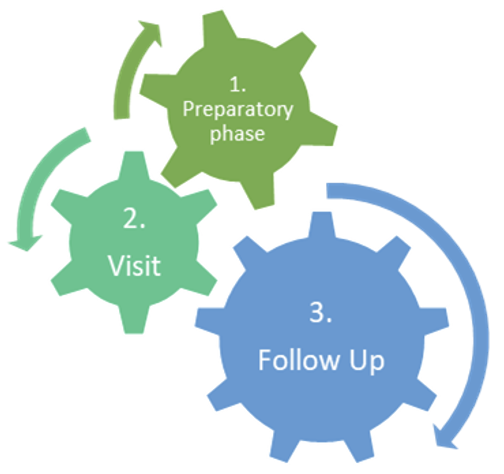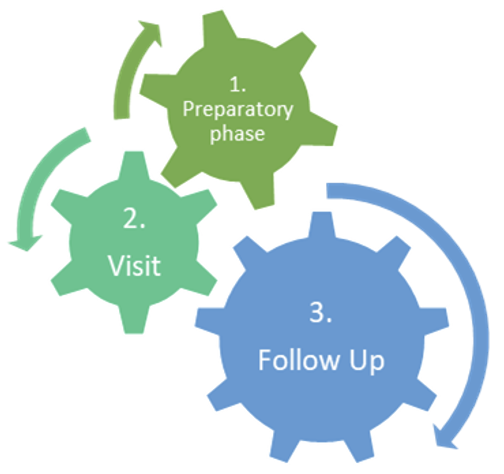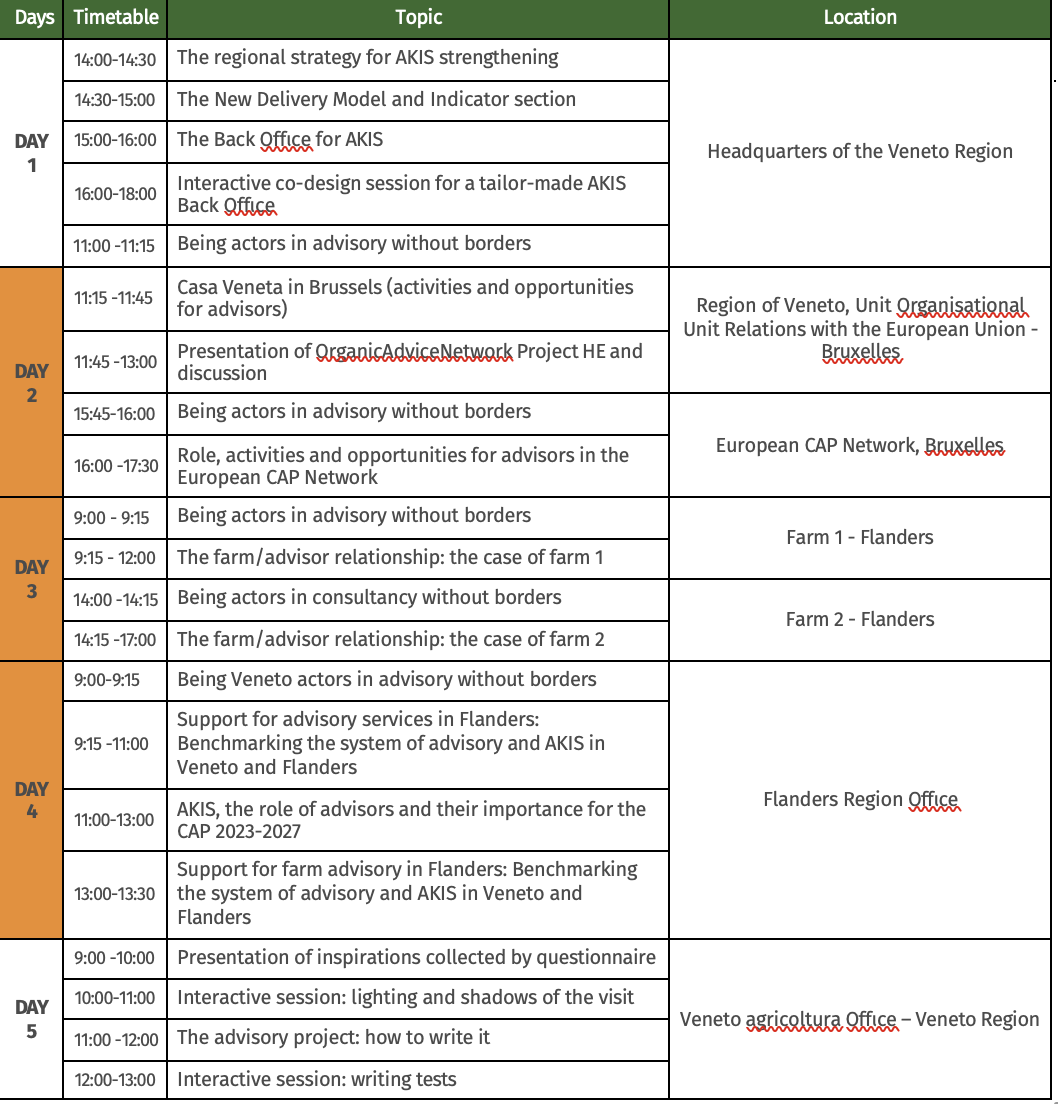2024
advisory services
peer-to-peer learning
study visits

Integrating advisors into Agricultural Knowledge and Innovation Systems (AKIS) is crucial for fostering a comprehensive understanding of the economic, environmental, and social dimensions of agriculture. By ensuring that advisors are actively involved in AKIS, they can provide up-to-date technological and scientific insights derived from research and innovation (R&I), thus enhancing the overall effectiveness of agricultural practices. To achieve this goal, Managing Authorities must develop and implement robust strategies that prioritize and boost the professional development of both advisors and innovation support service providers.
One effective approach to strengthen this integration is to create training pathways that emphasize live exchanges of knowledge and experiences. Such hands-on learning opportunities facilitate deeper understanding and practical application of concepts, allowing advisors to engage directly with innovative practices in real-world settings. This interactive form of education promotes collaboration, encourages the sharing of best practices, and enables participants to learn from each other's successes and challenges. In contrast to traditional training methods, which often rely on one-way communication, these dynamic experiences empower advisors to develop a diverse skill set, better equipping them to address agricultural challenges.
To enhance advisors’ capacities through peer-to-peer learning on interactive innovations, a Cross Visit (CV) of advisors from Veneto in Flanders was organized in collaboration between the AKIS coordination body of the RDCP 2023-2027 of Veneto Region and the Managing Authority of the CAP Strategic Plan (SP) of Flanders (BE).
The cross visit was organized as part of the Training for Advisors measure funded by the 2014-2020 Rural Development Program of Veneto Region and managed by Veneto Agricoltura Agency.
The CV approach promoted the exchange of experiences through peer-to-peer learning between actors from different contexts. The primary objective was to understand the background of the innovation process and the role advisors play in it, with the overall aim of transferring this knowledge to their respective professional contexts and beyond. CVs acts as a catalyst for inspiration, providing participants with a wealth of valuable insights, practical tools, and a common language that enhances their ability to collaborate and innovate. These experiences not only broaden advisors' perspectives but also equip them with the skills and confidence needed to apply new approaches and address complex challenges when they return to their respective regions. By fostering peer-to-peer learning and real- world exchanges, CVs empower advisory services providers to adopt innovative practices more effectively and contribute to sustainable solutions tailored to their local contexts.
The Cross Visit was part of a broader training program titled "I am an AKIS Actor! Toward New Horizons in Agricultural Advisory 2023-2027: Scenes Inside and Out," which spanned a total duration of five days.
Out of them, the cross-visit consisted of 3 days (see orange cells in table 1) and engaged 13 participants (9 advisors and 4 tutors from Veneto Region) visiting some representatives from the European Commision (EC) and EU CAP Network and some Flemish farms involved in Operational Groups (OGs).
The cross visit was decided due to the meeting of the AKIS coordination body of Veneto Region and the managing authority of the CAP SP of Flanders, held during one of the general assemblies of the AKIS coordination bodies of modernAKIS project EU.
The CV was structured into three key phases:

1) Preparatory phase
Before departure, a preparatory session was conducted to engage participants and foster collaboration. During this session, an overview of the regional AKIS framework was presented, with particular emphasis on the New Delivery Model and the role of the Back Office in supporting consultancy services. This provided participants with a solid understanding of how the AKIS system operates at the regional level, ensuring they are well-prepared to contribute meaningfully during the visit and align their insights with current strategic approaches.
2) Visit Phase
During the Cross Visit days, participants engaged directly with on-the-ground examples of innovative practices and solutions applied in Flanders. They interacted with key stakeholders, such as farmers, advisors, operational groups, and European Authorities (EC and EU CAP Network) who shared insights and demonstrated successful approaches in solving local agricultural challenges. This phase was highly interactive, allowing participants to observe practical applications of concepts discussed during the preparatory phase. The hands-on nature of the visit provided valuable real-world context and deepened understanding, as participants had the opportunity to ask questions, exchange ideas, and compare practices with those from their own regions.
The focus of the peer-to-peer exchange was on the following topics:
3) Follow-up Phase
After the visit, a follow-up phase was conducted to ensure the knowledge gained was effectively retained and applied. This included the following activities:
Satisfaction survey: Participants completed the satisfaction questionnaires to provide feedback on the different aspects of the visit, allowing organizers to assess the impact of the various interventions and presentations. This feedback also helps identify which activities or insights were most valuable for participants’ professional development.
Role-playing game session: participants were divided into three groups, each focusing on a specific theme related to advisory services. Each group was tasked with designing an advisory proposal addressing a particular problem. The proposal must include the problem the advice was aimed to solve, the objectives, relevant regulations to take into account, and a detailed description of the proposed service, by detailing the number of visits required, the data to be collected, and other logistical details. This collaborative group work was time-bound, lasting 45 minutes, and encouraged participants to think critically and creatively about real-world advisory challenges.
The follow-up phase encourages reflection and reinforces the lessons learned, ensuring that the knowledge acquired during the visit was translated into practical improvements in advisory practices once participants return to their territories.
Table 1: Program of the course “I am an AKIS Actor! Toward New Horizons in Agricultural Advisory 2023-2027: Scenes Inside and Out”

The following steps are essential for organizing a Cross Visit: